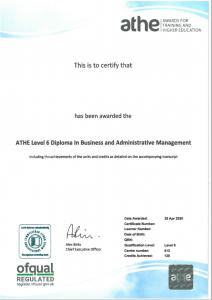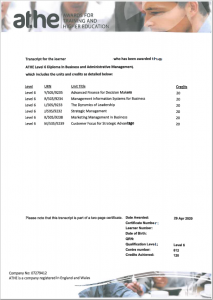Business and Administrative Management
Level 6 Course – £1800
Progress onto University final Year
OPTION
Choose your course option
Business and Administrative Management
Package Includes
- Full Course Materials and Assignments
Also Include
- Unlimited tutor support
- Recognised Ofqual Qualification
£1800
Most Popular
Business and Administrative Management (Level 6) + Business Strategic Management (Level 7)
Package Includes
- Business and Administrative Management (Level 6) Full Course Materials and Exams
- Postgraduate MBA (Level 7) Full Course Materials and Exams
Also Include
- Unlimited tutor support
- Recognised Ofqual Qualification
£2500
About the course
This course will be most suited to individuals who are at least 25 years old and have 5 years managerial work experience and do not have a degree but wish to study for an MBA or Postgraduate business programme. On successful completion of the course, students will be able to enrol onto our Level 7 Postgraduate Diploma in Strategic Management or a range of other postgraduate courses.
Examples of University Progression
- Southampton Solent University
- University of Derby
- University of Lincoln
- University of Central Lancashire (UCLan)
- Middlesex University
Awarding Body

DETAILS
Course Details
Course fees
The fee for enrolling onto the level 6 course is £1800.
Students can make payment using one of the following methods:
- Credit or debit card
- Bank transfer
- Interest free monthly instalments
- Paypal
- Western Union
What is included in the cost of my course?
Personal tutor support with 1-2-1 Skype sessions
Dedicated student support
Access to an online social learning forum
Assignment marking and feedback
FREE NUS Extra card worth £19.90
FREE laptop
Free CV writing help on completion of the course
University progression
Course overview
Am I eligible for this progamme?
Level 6 module listing
There is clear evidence that information technology provides competitive advantage, whatever the business sphere an organisation operates it, this module will assess pros and cons of using information technology within business.
Effective communications
Information is the most valuable asset in the contemporary organisation, and communication is the method by which information is shared. It is on the basis of information that business decisions are made. So without effective communications, an organisation simply cannot perform optimally.
High performance teams
This module is designed for both new and experienced managers. Using a mix of information, personal and team activities, it aims to help learners develop new team building skills or refine and expand the team building skills they already possess.
Leadership skills
Good leadership is essential for success in any organisation, whether in the private or public sector. Today, rapid change, in the form of a constantly changing competitive environment, innovations in technology and changing economic conditions, have led to the realisation that leadership is a skill to be developed.
Manager’s toolkit
There are literally thousands of management tools and models which can be used for analysis, problem solving and strategy development. The trick for the practising manager is to master a few which are versatile and which can be used in most of the situations you are likely to encounter.
Managing and using finance
This module covers key areas of accounting, as seen from a business perspective. It explains how accountancy can inform and guide management decisions.
Managing and using marketing
The focus of marketing is on the customer and customer satisfaction – meeting the needs of customers through the products/services we sell and offering the customer what they perceive as value. Today customers have higher and higher expectations for quality, service and value.
Managing organisations
There is a great deal of focus on creating the right type of organisation today because it is recognised that the structure, culture and management of the organisation has a huge influence on organisational performance.
Personal effectiveness
So what is personal effectiveness? Personal effectiveness covers those skills and abilities that we need to have, regardless of our job, status or professional background. Personal effectiveness is about using the key skills we have identified to achieve greater productivity and successful results – whether that be on a business or personal basis.
Quality and excellence
The words quality and excellence are used in a wide variety of contexts in organisations. We refer to a quality product, a quality company, excellent business procedures or an excellent service. So what exactly do we mean by these terms? Does quality mean conformance to specifications? Does it mean a product or service without flaws? Does it mean excellence?
Written assignments
The ATHE level 6 Business and administrative Management Course has 10 modules and 6 written assignments. On completion of the modules, students will be given access to the assignments. The assignments are approximately 5,000-8,000 words each. Students are provided support on the modules and assignments via the ‘Tutor’ section of the learning platform.
Students must complete 6 of the 8 below units:
Mandatory (students must complete all 4):
1. Strategic management
2. The dynamics of leadership
3. Management information systems for business
4. Advanced finance for decision makers
Optional (students may choose 2 to complete):
1. Marketing management in business
2. Customer focus for strategic advantage
3. Leadership skills
4. Managing risk in business
More information about the Level 6 units can be found here https://athe.co.uk/level-6-business-and-administrative-management-qualification/
Sample certificate


TESTIMONIALS
What Our Students Say
Catherine Tuhirirwe
Level 5 Undergraduate Extended Diploma in Management
I would definitely say The Professional Learning Institute is a fantastic alternative to University Level studies.
James Rhodes
Level 3 Diploma in Management


